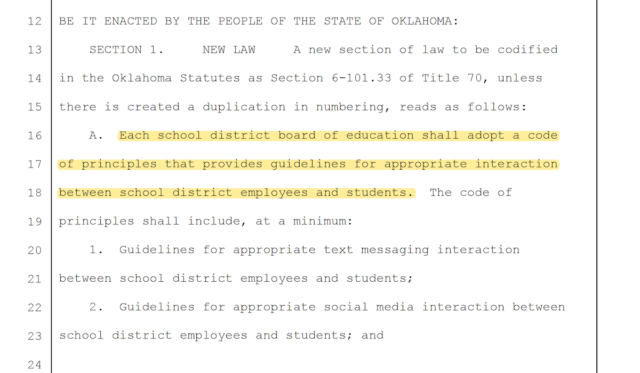
Oklahoma has more than 500 independent school districts. If that seems like a lot, well, it is. Whatever action one district takes to address an issue does not necessarily occur in the rest of the state’s districts.
As a result, state lawmakers sometimes propose statutes requiring certain actions across all public school districts. These statewide “mandates” can be controversial, can be modified with the frightening word “unfunded” and can be opposed ad hominem by various political parties or movements, depending on a legislative year’s atmosphere.
Last week, SB 45 failed as a “mandate,” despite endless evidence that a pervasive and perverted problem remains unaddressed.
The two-page bill, by Sen. Ron Sharp (R-Shawnee), would have required each school district’s board of education to “adopt a code of principles that provides guidelines for appropriate interaction between school district employees and students.”
The bill would have required the code to feature at least three components:
- Guidelines for appropriate text messaging interaction between school employees and students;
- Guidelines for appropriate social media interaction between school employees and students;
- Information about potential penalties for being convicted of inappropriate sexual interaction with a student.
Sharp cited the national epidemic of teachers having sex with students, a problem exacerbated by advancing communication technologies. For his trouble, Sharp heard criticism of “mandates” and watched the bill fail 19-27, with 18 Republicans and all nine of the chamber’s Democrats voting against.
“That is how many of the relationships between students and teachers are starting today,” Sharp said Thursday of text or social media communications. “This was an attempt of which to try to explain to teachers the problems with any improper communication. It should have reminded them that this is a criminal offense, and it could have prevented some of these improper relationships starting.”
Speaking of the devil
Days after the Senate killed SB 45, a 25-year-old female former teacher in Coleman, Oklahoma, pleaded guilty to having sex with a then-16-year-old male student in 2017.
Located in rural Johnston County, Coleman Public Schools has 159 enrolled students and lists four “administration policies” on its website, none of which are the teacher handbook or pertain to student/teacher communications. A Fox affiliate in the Sherman/Ada TV market cited a Coleman High School graduate who said the district previously employed another teacher who was sexually involved with a student.
In the Oklahoma State Senate, the school district is represented by freshman Sen. David Bullard (R-Durant) who voted in favor of SB 45.
Sharp remained baffled as to his bill’s demise.
“It had zero fiscal impact since the teacher handbook is updated every year, and therefore as to why they thought this was a mandate, I do not understand,” Sharp said. “It would have made a teacher think about it twice. That was the objective, yet it was voted down.”
Problem only increasing
Those intimately familiar with the machinations of the Oklahoma Legislature are likely unsurprised by the failure of a small, simple effort aimed at addressing a big problem.
In the House last week, a complex and bipartisan series of ideological speedbumps derailed a bill aimed at teaching students (and teachers) about “consent and healthy relationships.” The word “mandate” found its way into the conversation there, too. Meanwhile, the House’s high school page program has been suspended after one page accused another page of sexual assault.
But the failure of Sharp’s bill received far less attention, despite the shocking number of Oklahoma educators who have been caught in sexual relationships with students.
A lengthy rundown from The Oklahoman in 2016 featured 14 public school district employees who have been prosecuted for criminal sexual activity. Nationally, statistics indicate that such situations are increasing in frequency, or are at least being detected more.
The Texas Education Agency opened 222 investigations into school district employees alleged to be sexually involved with students during the 2015-2016 school year, a steady increase over the previous six years.
In 2015, Oklahoma lawmakers passed SB 711 to require school districts to tell the Oklahoma State Board of Education when teachers resign or have their employment recommended for termination owing to criminal allegations of sexual misconduct. The bill passed the Senate unanimously and only received opposition from seven House Democrats.
Superintendent for Public Instruction Joy Hofmeister praised lawmakers who supported the measure for “their foresight to proactively defend the safety of every public school student in Oklahoma.”
The bill functionally meant offending educators would be more likely to have their teaching certifications revoked, something that happened to the Coleman Public Schools teacher.
Unfortunately, local headlines are still detailing inappropriate sexual exploits by school employees, and a majority of the Oklahoma State Senate believes mandating a “code of principles” for teacher-student communications would be too onerous.
With thousands upon thousands of alternatively and emergency certified educators now filling Oklahoma classrooms, legislators appear poised to finish the 2019 session without taking even the smallest step to emphasize boundaries between teachers and students.
When in doubt, do nothing, right?





















